Research profile
As a university, it is both our mission and our passion to contribute to the search for solutions to the economic and social challenges facing us today. The acquisition of scientific knowledge from application-oriented research also serves as the foundation for providing practical and sound instruction.
Our research mission allows us to play an active role in scientific and academic discussions as a participant in national and international projects.
The guiding theme of research at Brand University of Applied Sciences is, in accordance with the orientation of the university, the topic “brand” in all its facets. The research focuses on the components of the paradigm of “Brand Thinking” developed at the BU, which seeks to holistically approach the examination of brands and reflect it in all of its areas.
The spectrum of topics ranges from theoretical cultural studies to practical artistic-aesthetic and application-oriented research on brand management, communication and design as well as related topics. Our research is currently focused on two research clusters that reflect the university’s interdisciplinary approach: “Brands and Brand Culture” and “Brands in the Digital Age”.
Brands are created by people – so every brand development is also a product of the culture from which it originates. At the same time, culture also determines how we perceive brands and interact with them. Especially in an international context, culture is a very relevant aspect of branding. A brand expert must therefore always keep in mind and research in advance which cultural factors can influence the perception of his product in the target market and align his brand strategy accordingly.
As a university at which the Communications and Management departments work in equal parts on researching and transmitting brand-related content, our research profile naturally includes an application-oriented examination of “brands” from a humanities and cultural studies perspective. At the same time, a practical, artistic examination of brands also takes place.
Associated topics:
aesthetic and artistic-creative aspects of the topic “brand”
cultural-philosophical aspects of the subject area “brand”
inter- and transcultural perspectives on “brand” (behavioural-scientific investigation of brand perception, brand positioning, consumer research, user experience design etc.)
Today, brands are, of course, (also) digital. This means that classic disciplines such as brand management and brand design naturally also include questions about big data applications and the use of artificial intelligence. This results in a dynamic, application-oriented field of research in the field of brand research.
Associated topics:
Artificial Intelligence in Usability, Brand Management and Customer Management
Use of Big Data for the design of the elements of the marketing mix (e.g. by simulations and forecasts for the design of pricing policies or the development of artificial test persons, calculation of customer life value)
Brand Equity: brand value calculation with the help of a “brand ticker”
Design professions in the age of conversational interfaces and artificial intelligence
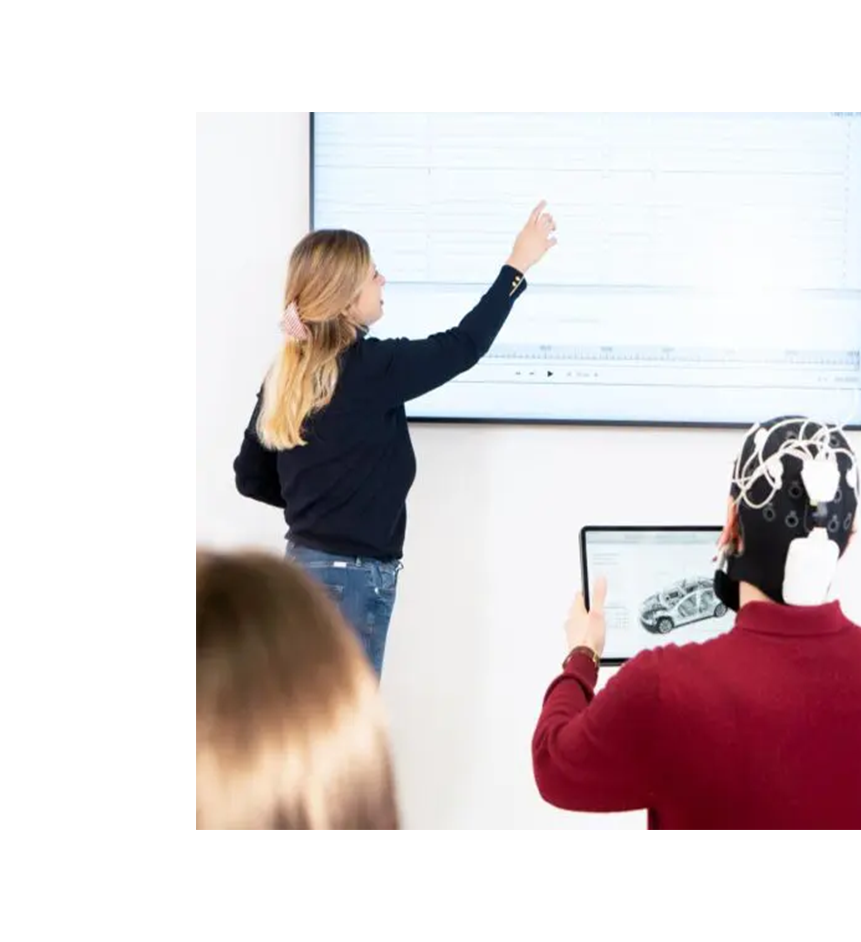
The Brand Research Lab at the Brand University of Applied Sciences is a teaching and learning laboratory for innovative research. It offers professors, lecturers, doctoral candidates and students a space for interdisciplinary studies, experiments and surveys focussing on brands, new media and technologies. The research utilises neuroscientific, empirical and intercultural methods. The laboratory supports the promotion of young scientists and strengthens the university's expertise in quantitative and qualitative social and economic science methods.
The equipment includes eye tracking, EEG, software for AI and VR as well as analysis software such as Matlab. Unconscious processes such as emotions and motivation are investigated using psychophysiological methods. The laboratory can be used by members of the university and for external research projects.
At our university, early career research, internal research and collaborations are central pillars of our scientific orientation. We specifically promote young talents who contribute to research through innovative projects and help shape future findings. Our internal research strengthens our institutional expertise and enables us to provide new impetus and address current issues by focussing on specific areas.
At the same time, we attach great importance to collaborations - both with other universities and with companies and research institutes. These partnerships enable us to work in an interdisciplinary manner, utilise synergies and jointly develop sustainable solutions for social challenges. In this way, we create a dynamic environment in which scientific excellence and practical research go hand in hand.
Participants: Drashti Patel, Qian Chen, Minghao Liu
Type of Project: Junior Research
Research Period: March to August 2021
Project Poster: Download
Participants: Gabriela Pardo, Pataraporn Saisawang, Xinyuan Zhang, Yuehting Ling
Type of Project: Junior Research
Research Period: March to August 2021
Project Poster: Download
Participants: Ella Göbel, Lynn Treudler, Julien Schlebusch, Max Suhr
Type of Project: Junior Research
Research Period: March to August 2021
Project Poster: Download
Participant: Petros Michalopoulos
Type of Project: Junior Research
Research Period: March to June 2021
Project Poster: Download
Participants: Hanne Welinder & Alina Schmidt
Type of Project: Junior Research
Research Period: March to September 2020
Project Poster: Download
Participants: Henrike Wode & Niklas Schmid-Burgk
Type of Project: Junior Research
Research Period: March to September 2020
Project Poster: Download
Participants: Ruixiang Guo & Xing Chen
Type of Project: Junior Research
Research Period: March to September 2020
Project Poster: Download
Participants: Julia Reichel & Ruben Victor Thaysen
Type of Project: Junior Research
Research Period: March to September 2020
Participants: Prof. Dr. Yonca Limon-Calisan, Dr. Regine Heimers
Type of Project: Whitepaper with Jung von Matt
Research Period: May to June 2021
Participants: Prof. Dr. Stefan Waller
Research Period: April 2020 to March 2021
Participants: Prof. Dr. Sven Christiansen
Research Period: 2020/2021
Participants: Prof. Ute Röseler
Research Period: February to September 2020
Project: Driving the adoption of eco-labels in Germany.
Participants: Prof. Dr. Yonca Limon-Calisan, Prof. Dr. Michael Fretschner, Maik Riggers
More Information: Study Design
Project: Cooperative Doctoral Programme
Participants: Prof. Dr. Henrik Sattler, Prof. Dr. Oliver Schnittka, Prof. Dr. Yonca Limon-Calisan
Project: The Relationship between Customer Engagement, Involvement, Loyalty Program Mechanisms, and Program Loyalty.
Participants: Dr. Regine Heimers, Prf. Dr. Edith Rüger-Muck, Prof. Dr. Yonca Limon-Calisan, Prof. Dr. Ludwig Theuvsen
Project: A/B testing to optimize the digital interaction between companies and customers.
Participants: Dr. Thomas Suwelack, Prof. Dr. Manuel Stegemann
Publication: Stegemann, M., & Suwelack, T. (2020). A/B-Testing–Verfahren zur Optimierung der digitalen Interaktion zwischen Konsumenten und Unternehmen. In Data-driven Marketing (pp. 159-176). Wiesbaden: Springer Gabler.
Project: How Deriving Information from Faces Can Alter Our Choices: Holistic Face Types, Personality Trait Impressions, and Alterations in Choice
Participants: Prof. Dr. Yonca Limon-Calisan, Prof. Dr. Martin Reimann, Prof. Dr. Ulrich R. Orth,Prof. Dr. Alberto Lopez
Project: What Determines What? The question under investigation is whether monetary brand valuations influence share prices and/or vice versa.
Participants: Prof. Dr. Sven Christiansen, Prof. Dr. Stefan Mittnik
Project: Designing a machine-supported response tool for measuring the effectiveness of advertising. This project explores the question as to whether statistical methods could be used to replace elaborate surveys of test persons.
Participants: Prof. Dr. Sven Christiansen, Prof. Dr. Stefan Mittnik
The Research Committee of Brand University of Applied Sciences sees itself as a platform whose task is to promote the university's research activities.
The thematic focussing of the members' research interests is subject-oriented and
teaching and practice-orientated to the needs of the economy.
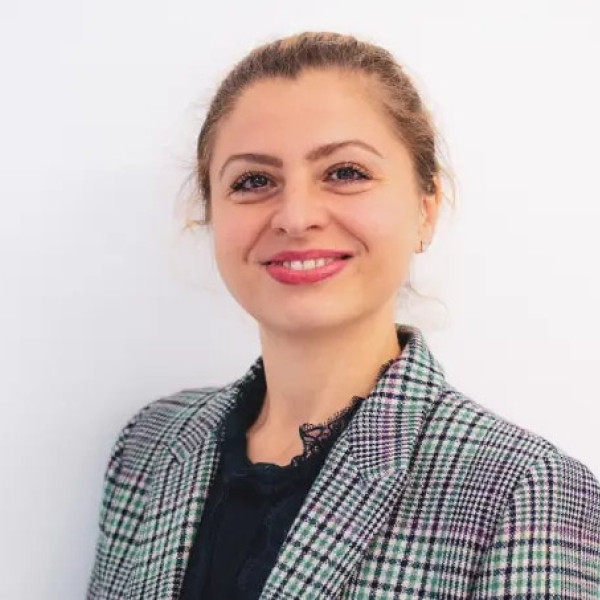
Cross-cultural consumer research and brand perception
- Influence of packaging design cues on brand perception
- Endorsement
- Emotions and social context
- Mood induction and reactions to product design
- Priming and brand choices
Influence of loyalty programmes on consumer brand engagement

Company and brand valuation
Customer Life Value
Dynamic Pricing
General prognosis methods and simulations
for marketing relevant questions
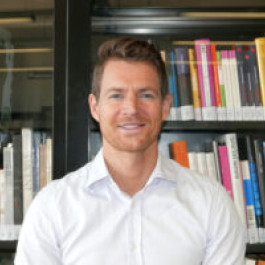
data based A/B/n-tests in marketing
Effects of marketing stimuli on buyer behavior
- money-back guarantee
- cost transparency
Brand management
- Private label brands
- Brand extension
Artificial intelligence in customer management
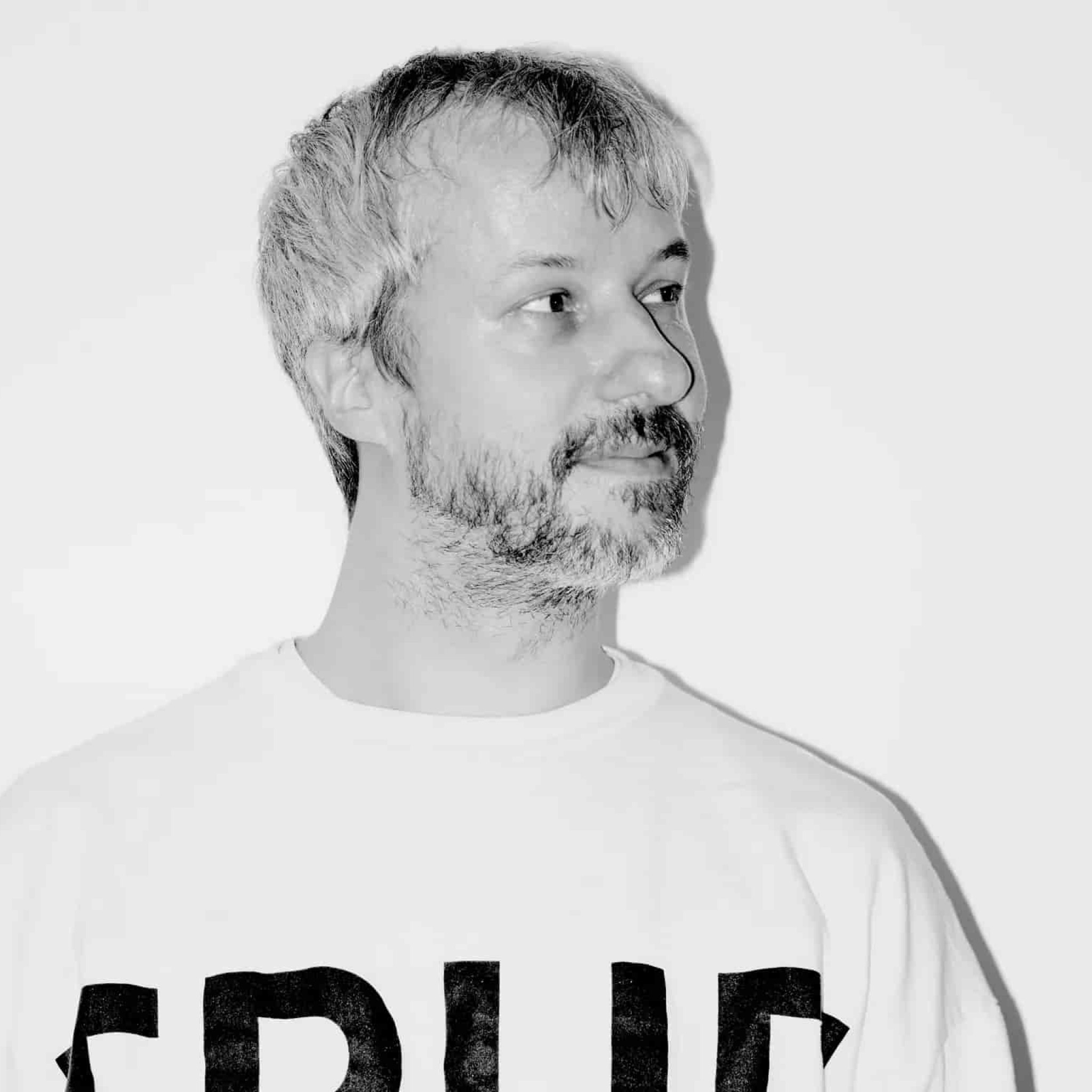
Spatial immersive interfaces/experiences
Machine learning/artificial intelligence

Fundamental research
- Cultural philosophy and anthropology of brands
- Brand aesthetics
- Ethics and brand culture
Based on this, investigations with a focus on German-Chinese exchange
- Brands as part of certain cultures
- Brands in intercultural exchange
- Brands as transcultural phenomena
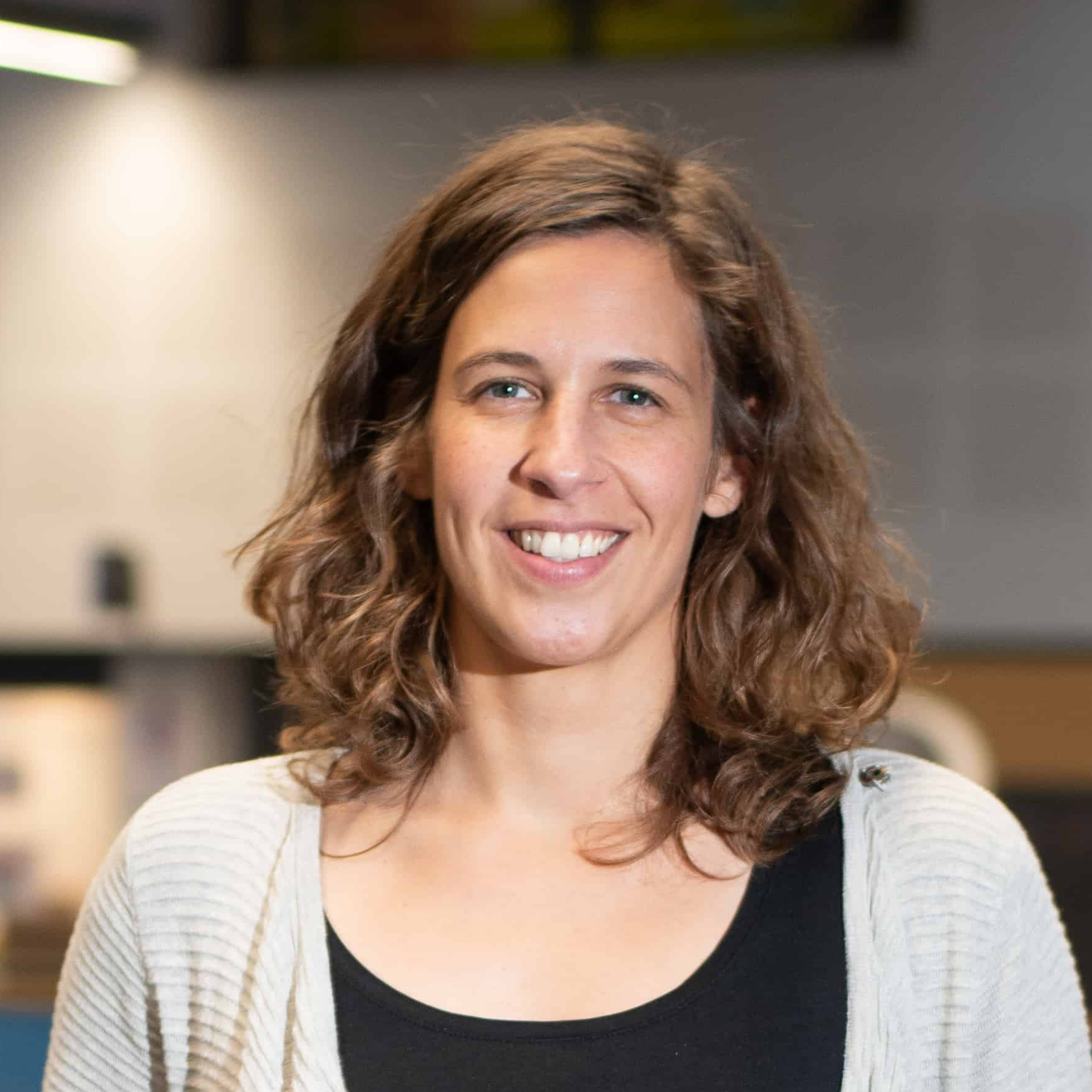
Customer Experience
Quantitative Methods
The BU regularly hosts guest lectures in which speakers from the worlds of business, industry and science present the latest insights from their fields. Fascinating case studies and problems offer the chance for in-depth discussions.
“Insight form Silicaon Valley. Hamburg to the USA. And back.”
Fred Fahlke (Ex-Google, Ex-Meta, Founder nice outside)
“Digital transformation of a new decade-old trading company through the establishment of an Innovation Lab.”
Lotta Willig (Brand- & Project Manager)
Marco Ivers (Managing Director, Head of Design & Innovation)
Jennifer Leewis (Designer & Process Owner)
“Demystifying Metaverse + Web3”
For real?! Metaverse Consulting
Felix Burger (Creative Innovation Director)
“BMW Joytopia”
Jung von Matt
Felix Burger (Creative Innovation Director)
“The Brain runs on fun”
Karl Anders - Contemporary Branding
Claudia Fischer-Appelt (Founder + Creative Director)
Lars Kreyenhagen (Founder + Strategy Director)
“Welcome to the Bubbleverse!”
Jung von Matt
Robert Andersen
“NFTs and Web3 - Basics for a new e-commerce: How to stay curious in the ever-changing digital world all brands operate in today”
Jürgen Alker
“The Story of Entale: Form 0 to 1 in 90 Days”
Female Founders Londoner StartUp entale
Hannah Blake, Co-Founder & Head of Content
“Branding Deichkind”
Björn Benefiz (Deutsche Band Deichkind)
“The Product Field - understanding innovation”
Michael Schieben (Speaker, Autor)
“About success. And about the organizational power of a strong brand”
Jung von Matt
Michael Schneider (Strategy Director)
“Predicting colour preferences and colour emotions”
Glad & Heldig
Sophie Brodtkorb (Scientific Creative)
“An overview about Facebook advertising with focus on KPI“
Facebook
Celina Degen (Business Education Trainer)
“The story of entale: from 0 to 1 in 90 days”
Entale
Greta Anderson (UX Designer) & Hannah Blake (Co-Founder of Entale)
“Immersive Brand Experiences”
Demodern
Hannah Johnson (Director Interactive Storytelling), Ann-Kristin Delplanque (UX Designerin)
“Selbstständigkeit im Studium – Die Bürokratie”
Freelance Junior
Paul Weinreich
“#China – Digital Innovation behind the Great Firewall”
ChinaWechatting
Torsten Sollitzer
“Hyper Fountain – Dornbracht Research Lab, Behind the Scenes”
Elastique
Andreas Schimmelpfennig (CEO)
„Audio Branding & Audio Strategy for Brands“
White Horse Music
Julian Krohn (Creative Director)
„How to make a traditional German company ‘fit’ for the future. Company transformation based on the example of Vorwerk flooring.”
Vorwerk Flooring
Florian Bausch (Ex-CMO)
“Practice Session – von der Theorie in die Praxis”
Sherpa Design
Henning Klimczak (CEO and founder)
“How AI can influence a brand’s success”
Natter.AI
Rob Taylor (CEO)
“Erfolgreiche Repositionierung der Marke Lacoste”
Lacoste
Lesley Bleakney, Philipp Witzke
“Make it Possible – Huawei communication and marketing in the age of Donald Trump”
Jung von Matt
Max Lederer (Executive Creative Cirector)
„How to build strong Business Relationships with an identity-oriented Approach“
Tamanguu
Dr. Johannes Ripken (Founder)
„Content Marketing – Chancen und Herausforderungen im B2B Marketing“
Lufthansa Industry Solutions
Heiko Packwitz (Chief Marketing & Communications Officer)
„EU – Back to University“
Europäische Kommission
Roberto Hayder (Principal Legal and Anti-Fraud Officer)
„Neurobranding: What people really want (from brands)“
Deloitte Digital
Daniel Könnecke (Partner Deloitte Digital)
„Marketing im B2B“
Wer liefert was
Philipp Gausling (Business Development Manager)
„Markenführung im digitalen Zeitalter“
Artaxo
Patrick Klingberg (CEO)
„Activating Brave“
Interbrand
Jan Glanzmann, Jana Gaukstern
„Creative in Silicon Valley“
Google, Instagram, Nest
Fred Fahlke
„NIVEA – from winning women’s heartbeats to winning consumer insights“
NIVEA, Beiersdorf
Isabel Maria Sá (Global Junior Brand Manager NIVEA Face Care), Insa Köhnsen (Expert Recruiting Working Students, Interns and University Marketing)
„Loro Piana, True Luxury Brand and Cultural Icon“
Loro Piana
Philippe Lamy (Managing Director Europa, Mittlerer Osten, Russland)
„8×4 – Wie man eine Traditionsmarke verjüngt“
8×4, Beiersdorf
Thorsten Trompeter (Senior Brand Manager), Chris Bartsch (Geschäftsführer Kreation, Digitalagentur BOOM)
„HaspaJOKER und das digitale Zukunftsmodell“
Hamburger Sparkasse
Sven Sahlberg
„Über Innovation. Jägermeister – eine Marke zwischen Kontinuität & Veränderung“
Jägermeister
Sebastian Koenen (Brand Manager Global Innovation & Design)
„Das Zeitalter des Teilens wird bis 2025 jedes Unternehmen erreicht haben“
Coomedia
Henning Schnittcher (Unternehmensberater und Managing Director von Coomedia)
„Social Impact through Design Thinking“
Impact Week
Michael Hübl (Co-Founder of Impact Week), Stina Kozok (International Brand Communication Student), Sina Petersen (Brand Design Student)
„Creating Iconic Brand Experiences“
Agentur Elastique
Betty Schimmelpfennig (Geschäftsführerin von Elastique)
„Wie die Elbphilharmonie zum weltweiten Liebling wurde“
Hamburg Marketing & Jung von Matt
„Business oder Busyness – Kreativität für Kunst, Kultur, Kommerz“
Atelier Disko
„Die Geheimnisse unbändiger Motivation“
Jonathan Schramke (Business Coach
„YouTube. The online Video Revolution“
YouTube, Google
Sabine Georg (Creative Agency Manager Google Germany)
„Best in Class Consumer Decision Journey“
Philips
Marek Sandrock (Senior E-Trade Marketing Manager)
„Wie werden wir die zukünftige Rolle eines Designers gestalten? Forschung durch Design“
Transfer
Andrea Augstein (Design Researcher, Gründerin)
„Branding to go“
Wir Design
Thorsten Grenius
„Haltung erzeugt Wirkung – Wie eine Kampagne eine Bank verändert“
Commerzbank
Uwe Hellmann (Director Brand Management and Corporate Marketing)
„Form follows Function – Design follows Strategy“
Interbrand
Ronald Bartikowsko (Creative Director)
To mark the annual start of the winter semester, the Department of Design held a half-day symposium at “designxport” in Hamburg’s HafenCity in October 2020.
The “Open Space” included an internal workshop, during which the expectations and career plans of design students were surveyed. The findings formed the basis for the subsequent panel discussion “Job profiles of the future”.
Invited as external guests were Prof. Stefan Wölwer, Professor of Interaction Design and Design Researcher at HAWK Hildesheim, Maximilian Schöngen, Global Creative Strategist and Member of the Creative Board at Serviceplan. They discussed with Prof. Ansgar Eidens and Prof. Michael Jonas as well as the students which professional expertise and which types of specialists and generalists will be necessary in the future in order to act in a post-pandemic and AI-influenced social context in the triangle of forces of people, brand and market.
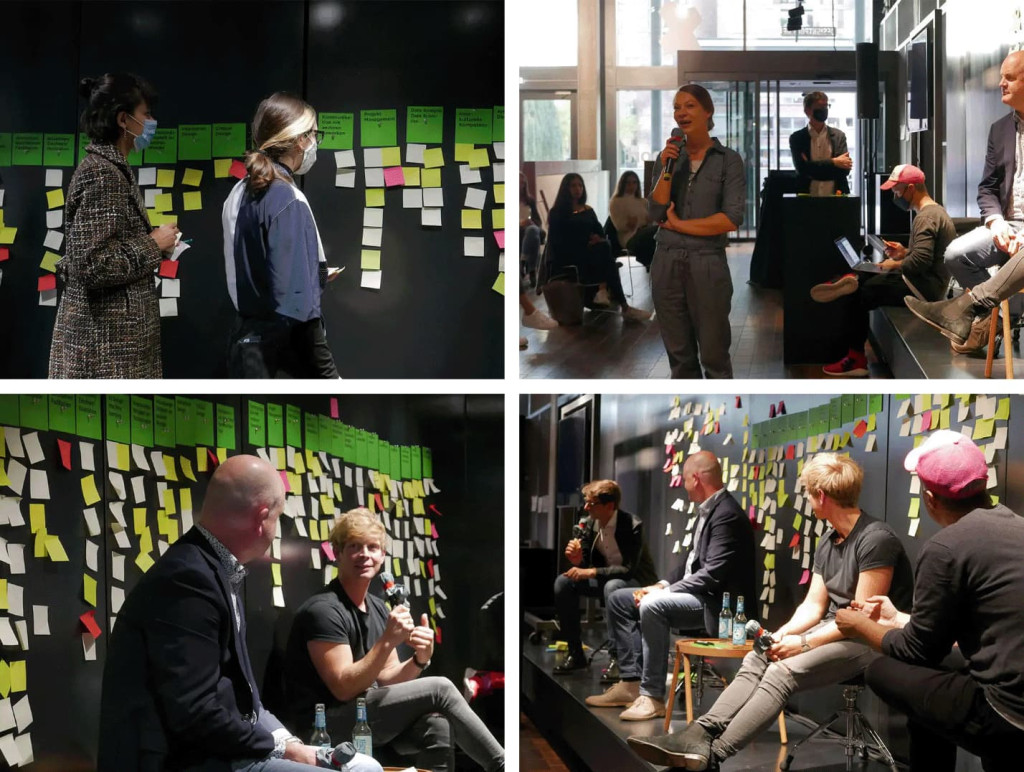
The Brand University of Applied Sciences is, in cooperation with ‘DACHINA interchange’ and ‘China Central Television (CCTV)’, the organiser of the annual DACHINA Markendialog brand dialogue conference.
This conference offers a platform for scientific and cultural exchange between the DACH region and China. The focus is on current topics in brand science and practice.
Every year, the DACHINA Markendialog conference offers an exclusive series of presentations given by high-calibre speakers and a panel discussion that are followed by a get-together in which participants from each region can network and talk with managers of global companies and experts from the realms of academia and science.
Surplus sponsorship revenues generated by the event are converted into research stipends for the Brand Innovation M.A. master’s degree course, helping support students at the Brand University of Applied Sciences.
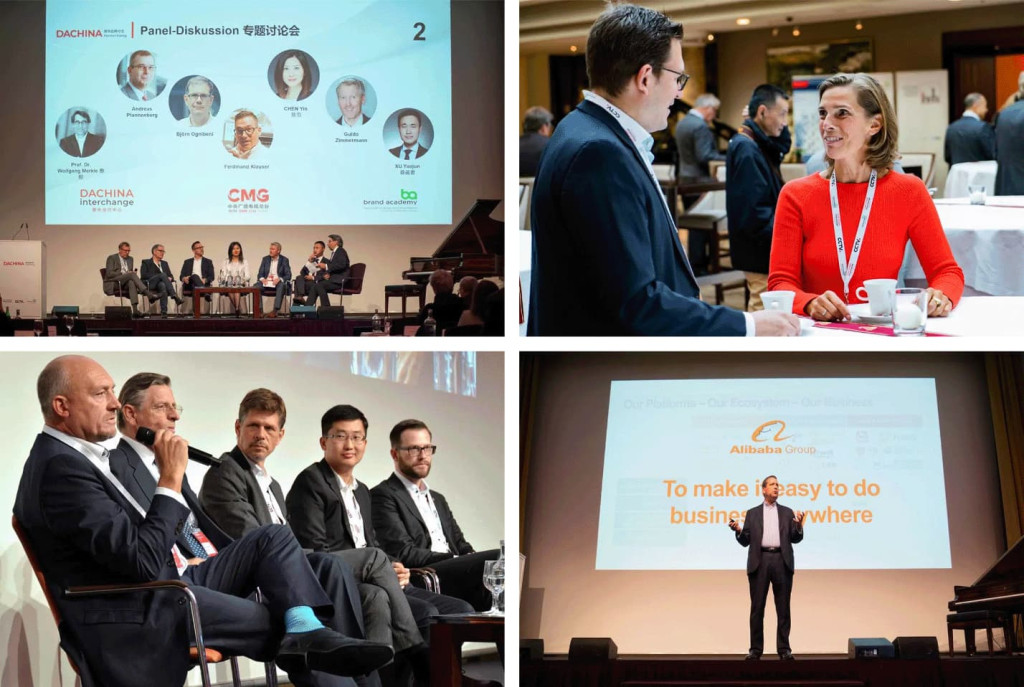
Groll, S. (2025). Forms of design some considerations for a macro theoretical perspective in design. Journal of Engineering Design, 1–18. https://doi.org/10.1080/09544828.2025.2475555
Karantonis, K., Schnittka, O., Farsky, M. et al. Empirical validation of a new technique (‘select-and-rank’) to measure brand preference. J Brand Manag (2025). https://doi.org/10.1057/s41262-025-00379-y
Granulo, A., Kranzbühler, A.-M., Fuchs, C. & Puntoni, S. (2025). Collective Layoffs and Offshoring: A Social Contract Account. Journal of Consumer Research. https://doi.org/10.1093/jcr/ucaf001
Waller, S. (2024). Marke und Mythos. Springer Verlag
Limon-Calisan, Y. & Heimers, R. (2024): Unternehmen mit Purpose Markenführung für Unternehmen mit Purpose. Mit dem Brand Purpose Model Canvas zur nachhaltigen Marke. Springer Gabler Wiesbaden.
Kranzbühler, A. & H.N. Schifferstein (2023). The Effect of Meat-Shaming on Meat Eaters’ Emotions and Intentions to Adapt Behavior, Food Quality and Preference, 107, 104831.
Limon-Calisan Y., Heimers R., Duerl F. & Flentje Ch. (2022). Purpose is dead, long live purpose! Fresh potential in times of dynamic brand management. (White Paper)
Stegemann, M., Xia Ang, F. & Suwelack, T. (2022). Creating a Customer Experience-Centric Startup – A Step-by-Step Framework. Springer International Publishing. (Interview mit Suwelack, T.)
Jonas, M. (2022). Hype oder Chance. Metaverse – Gestalten für die hybride Realität, PAGE Magazin, 2022 (04).
Kranzbühler, A, M.H.P. Kleijnen, P.W.J. Verlegh & A. Zerres (2020). “Beyond Valence: A Meta-Analysis of Discrete Emotions in Firm-Customer Encounters”, Journal of the Academy of Marketing Science, 48, 478-498.
Hua, T. (2020). Kunst und Leben. Autobiografie als Konzept. Berlin: Logos Verlag.
Eidens, A. (2020). Was ist eigentlich Empathic Branding?, PAGE online, https://page-online.de/branche-karriere/was-ist-eigentlich-empathic-branding/
Suwelack, T. (2020). Toolbox Customer Experience. Wiesbaden: Springer Gabler.
Stegemann, M., & Suwelack, T. (2020). A/B-Testing–Verfahren zur Optimierung der digitalen Interaktion zwischen Konsumenten und Unternehmen. In Data-driven Marketing (pp. 159-176). Wiesbaden: Springer Gabler.
Igelbrink J. (2020). Perceived Brand Localness – An Empirical Study. Gabler Verlag.
Kranzbühler, A., M.H.P. Kleijnen & P.W.J. Verlegh (2019). “Outsourcing the Pain, Keeping the Pleasure: Effects of Outsourced Touchpoints in the Customer Journey”, Journal of the Academy of Marketing Science, 47, 308-327.
Kranzbühler, A., M.H.P. Kleijnen, P.W.J. Verlegh & M. Teerling (2019). “When Similarity Beats Expertise: Differential Effects of Patient and Expert Ratings on Physician Choice”, Journal of Medical Internet Research, Jun 26;21(6):e12454.
Jonas, M. (2019). Schnell, schneller, Hackathon, PAGE Magazin, 2019 (09).
Jonas, M. (2019). Was ist eigentlich Virtual Reality Design?, PAGE online, https://page-online.de/branche-karriere/was-ist-eigentlich-virtual-reality-design/#more-588518.
Jonas, M. (2019). Hackathons als Workshop-Format, PAGE Magazin, 2019 (08).
Tang, Hua (2019): Interface. Chinesische Gegenwartskunst und der europäische Dialog. Dissertation an der HfbK.
Kranzbühler, A., M.H.P. Kleijnen, R. Morgan & M. Teerling (2018). “The Multilevel Nature of Customer Experience Research: An Integrative Review and Research Agenda”, International Journal of Management Reviews, Vol. 20 (2), 433-456.
Limon Y., Reimann M., Orth U.R. & Bechara A. (2017). Fresh Faces for Established Brands: The Role of Holistic Type and Sequence of Exposure in Consumers’ Formation of Trait Inferences. In: Campbell, C. L. (Hrsg.): The Customer is NOT Always Right? Marketing Orientationsin a Dynamic Business World. Developments in Marketing Science: Proceedings of the Academy of Marketing Science. Cham: Springer.
Jonas, M. (2017): Das ist Virtual Reality Design, PAGE Magazin, 2017 (07).
Waller, S. (2017). Selbstbild und Sollen. Überlegungen im Anschluss an Gehlen und Kant. In: Puls, Schramm, Waller (Hrsg.): Kultur. Freiheit. Technik. Münster.
Schoeneberg, K.-P., Zerres, C., Fraß, A. & Igelbrink, J. (2016). Textmining – aktive Markenführung mittels Social Media Analytics. In: Lang, M. (Hrsg.): BI-Handbuch 2016. Düsseldorf: Symposium Verlag.
Kranzbühler, A., M.H.P. Kleijnen, P.W.J. Verlegh & M. Teerling (2015). “The Differential Effects of Peer and Expert Ratings on Choice”, MSI Working Paper No. 15-117, Marketing Science Institute, Cambridge, MA.
Christiansen, S (2015). Starke Marken, Starke Aktien, €uro, 2015 (11), 17-33.
Duncker, C., Röseler, U. & Fichtl, L. (2015). Marken-Positionierung: Auf der Suche nach verlässlichen Instrumenten, absatzwirtschaft – Zeitschrift für Marketing, 2015 (12), 76-79.
Erfgen, C., Zenker, S., & Sattler, H. (2015). The Vampire Effect: When Do Celebrity Endorsers Harm Brand Recall? International Journal of Research in Marketing (IJRM), 32 (2), 155-163.
Suwelack, T., Krafft, M. & Meffert, H. (2015). Zielgruppenspezifisches Management von Alumni-Organisationen – dargestellt am Beispiel des Ehemaligenvereins Marketing Alumni Münster e. V. In: Habermann, F. & Notz, M. (Hrsg.): Professionelles Alumni-Management.
Waller, S. (2015). Leben in Entlastung. Mensch und Naturzweck bei Arnold Gehlen. Konstanz: Herbert von Halem Verlag.
Bogomolova, S., Wentzel, F., & Limon-Calisan, Y. (2012). Loyalty vs spontaneity: disentangling the effect of brand equity vs priming on the choice of real life brands. Proceedings of the 2011 ANZMAC Conference.
Eidens, A. (2012): Studium Brand Design, PAGE, 2012 (10).
Suwelack, T., Hogreve, J. & Hoyer, W. D. (2012). Understanding Money-Back Guarantees: Cognitive, Affective, and Behavioral Outcomes, Journal of Retailing, 87 (4), 462-478.
Suwelack, T. & Krafft, M. (2012). Effects of Money-Back and Low Price Guarantees on Consumer Behavior. State of the Art and Future Research Perspectives, Wiesbaden: Springer, S. 531-558.
Eidens, A. (2011): Hübschmachen hat nichts mit Design zu tun, Managermagazin, 2011 (01).
Orth, U. & Y. Limon (2011). Persönlichkeitstransfer von Fürsprechern auf Marken: Psychologische und Neuronale Mechanismen. Schriftenreihe der Agrar- und Ernährungsws. Fakultät der Universität Kiel, Vorträge zur Hochschultagung 2011, Heft 117.
Christiansen, S. & Mittnik, S. (2011). Ganzheitliche Steuerung von ETF-Portfolios. In: O. Everling & G. Kirchhoff (Hrsg.), Exchange Traded Fund Rating, 200-220, Köln: Bank-Verlag. (Nominiert für den Deutschen Finanzbuchpreis 2012)
Igelbrink, J. (2011). Marktveränderungen bringen neue Anforderungen an das Modedesign. In: Boeck, Y. (Hrsg.): Traumberuf Modedesigner, 1. Aufl. Grünwald: Stiebner Verlag.
Duncker, C. & Röseler, U. (2011). Markenführung und Marketing – alles eins?, absatzwirtschaft – Zeitschrift für Marketing, 2011 (11), 34-36.
Waller, S. (2011). Vom Verschwinden des Wissens: Robert Menasses Phänomenologie der Entgeisterung. In: Dangel, T., Kömürcü, C. & Zimmermann, S. (Hrsg.): Dichten und Denken. Perspektiven zur Ästhetik, Heidelberg: Universitätsverlag Winter.
Christiansen, S. & Mittnik, S. (2010). Risiko besser in den Griff bekommen, Euro am Sonntag, 2010 (52), 28-30. Fischer, M., Völckner, F., & Sattler, H. (2010). How Important are Brands? A Cross-category, Cross-country Study. Journal of Marketing Research (JMR), 47, 823-839.
Fredebeul-Krein, T., Krafft, M. & Suwelack, T. (2010). Gegen den Strom – Proaktives Marketing- und Vertriebsmanagement in schwierigen Zeiten. In: Marketing Review St. Gallen, 27. (1), S. 8-13.
Limon, Y. (2010). Boosting Trait Inferences: Psychological and Neural Mechanisms in the Effect of Faces on Brand Perceptions, Dissertation, CAU Kiel
Orth, U., Limon, Y. & Rose, G. (2010). Store-Evoked Affect, Personalities, and Consumer. Emotional Attachments to Brands, Journal of Business Research, 63 (11), 1202-1208.
Orth, U. R., K. Bechthold & Limon, Y. (2010). Consumer Metacognitions: The Ease, Speed, and Accuracy of Inferring Meaning from Wine Packages. Proceedings of the 5th International Conference of the Academy of Wine Business Research, February 7-10, Auckland, New Zealand.
Orth, U. R., Heinrich F. & Limon, Y. (2010). Designing Wine Retail Interiors to Elicit Desirable Consumer Impressions. Proceedings of the 5th International Conference of the Academy of Wine Business Research, February 7-10, Auckland, New Zealand.
Krafft, M., Suwelack, T. & Niederhofer, M. (2009). Marktorientierte Unternehmensführung in der Rezession. In: Meffert (Hrsg.): Erfolgreich mit den Großen des Marketings, Frankfurt: Campus Verlag, S. 37-47.
Limon, Y., Kahle L. & Orth, U. (2009). Package Design as a Communications Vehicle in Cross-Cultural Values Shopping, Journal of International Marketing, 17 (1), 30-57.
Orth, U. & Limon, Y. (2009). Global standardisiertes oder lokal adaptiertes Marketing?, Schriftenreihe der Agrar- und Ernährungswissenschaftlichen Fakultät der Universität Kiel, Vorträge zur Hochschultagung 2009, Heft 114, 239-245.
Waller, S. (2009). Die Moral des Machens. Helmut Schmidt und die Philosophie. In: Zeitschrift für Hamburgische Geschichte Bd. 95, Hamburg.
Waller, S. (2009). Vernetzung und Institutionsabbau – ein Blick auf Arnold Gehlens Kulturphilosophie. In: Sozialpsychiatrische Informationen, Bonn.
Limon, Y. (2007). Packaging from a Cross-Cultural Perspective, Eurotürk, 19 (3), 39-40.
Waller, S. (2007). Konstruktion und Wahrnehmung: Sol LeWitt, Erwin Heerich, Rolf Bergmeier und Raimer Jochims. In: 66-03. Werke aus der Sammlung Lafrenz und Reinking, Weserburg/Museum für Moderne Kunst, Bremen.
Waller, S. (2007). Felix Droese, »Boot«, 1985; R. Penck, »Theorie in Hamburg, NÄHE FERN gesehen, FERNE nahgesehen, WELT GESCHEHEN, WELT VERSTEHEN«, 1989; Ian Hamilton Finlay, »Proposal for a Kunsthalle«, 1996; Rainer Oldendorf, »Still«, 1996; Sabine Mohr, »Où? – Wo?- Where?«, 2003. In: Fleckner, U. (Hrsg.): Kunst in der Stadt Hamburg. 40 Werke im öffentlichen Raum, Berlin: Nicolai.
Eidens, A. (2006): Beitrag zum Thema Wahrnehmungsgesetze, Kölner Jahrbuch zum Mediendesign 2006.
Bongard, J. (2002). Werbewirkungsforschung. Grundlagen – Probleme – Ansätze. Münster: LIT-Verlag.
Bongard, J. (2002). Beratung im Zeitalter des Internet. In: Klewes, J. & Gütler, A. (Hrsg.): Drama Beratung! Consulting oder Consultainment. Frankfurt a.M.: FAZ-Verlag.
Bongard, J. & Klewes, J. (2002). Zwischen Flexibilität und Stabilität. In: Klewes, J. & Gütler, A. (Hrsg.): Drama Beratung! Consulting oder Consultainment. Frankfurt a.M.: FAZ-Verlag.
Klewes, J., Bongard, J. & Sucht, T. (2002). Müssen Berater arrogant sein? Fakten und Thesen zur Beratung, pr-magazin, 2002 (8), 45-52.
Christiansen, S. (2001). Valuation of German Classical Warrants and Investigation of Trading Strategies (2001). In: S. Mittnik, (Hrsg.) Schriftenreihe zu Statistik und Ökonometrie, Berlin: Pro Business Verlag.
Eidens, A. (1998): Vorstellung der Diplomarbeit INTERACTION OF COLOR, ANNUAL MULTIMEDIA 1998, Düsseldorf: Metropolitan Verlag.
Eidens, A. (1997): Besprechung der Diplomarbeit INTERACTION OF COLOR. Screen multimedia 1997 (09), Ulm: macUp Verlag.
Eidens, A. (1997): Farbe interaktiv, Möglichkeiten interaktiver Lernmittel, MAPPE 1997 (08), München: Callwey Verlag.
A new format BU WHITEPAPER SERIES will soon follow here with the following content:
Research and design at BU is characterized by its practical orientation and the targeted transfer of knowledge between science and design as well as teaching and practice.
The BU white paper presents the results of these research and design projects. This ongoing work (“work in progress”) is intended to serve as inspiration and promote dialog with the public.
Creating added value through brands - this is what the Brand University in the heart of Hamburg stands for. And this is exactly what makes BU a university whose alumni are highly sought-after professionals in the marketing world, and whose alumni are in high demand.
With us, you will benefit from interdisciplinary teaching with practical relevance and an international focus - thanks to strong partners from Asia. Your studies combine Western and Eastern branding philosophies in a unique way.
